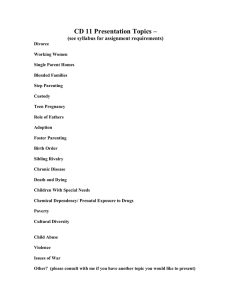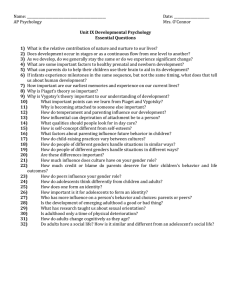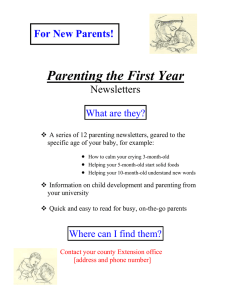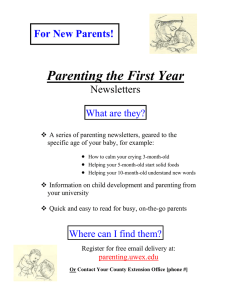M.Sc. (F.C.Sc.) Programme HDFS CBCS Courses
advertisement
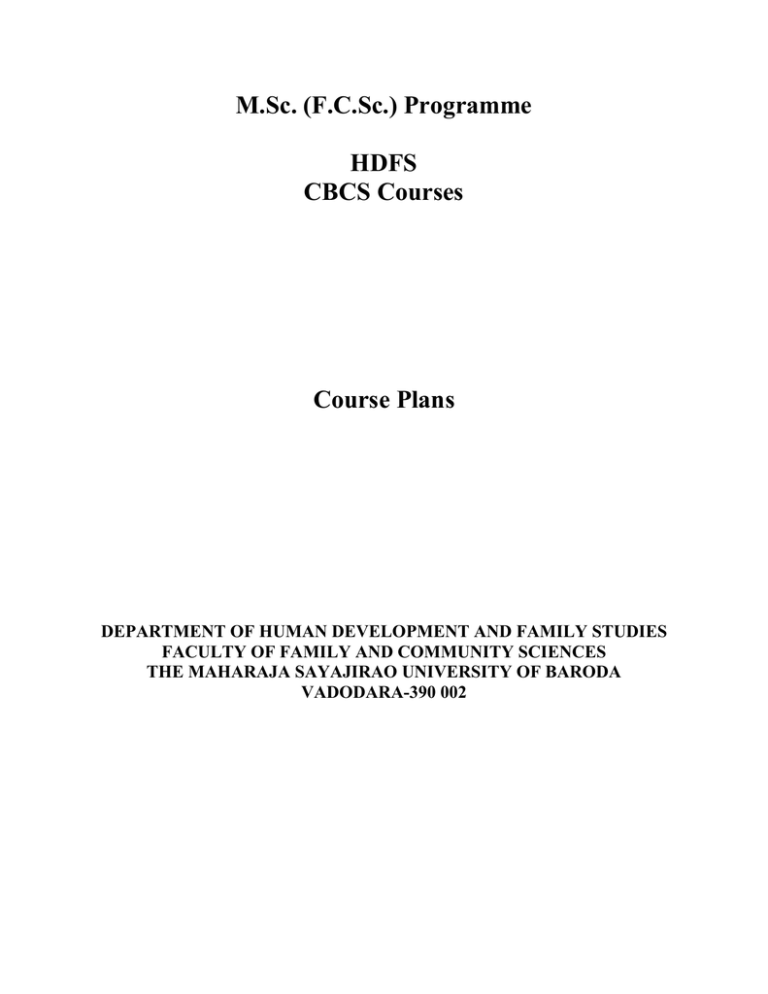
M.Sc. (F.C.Sc.) Programme HDFS CBCS Courses Course Plans DEPARTMENT OF HUMAN DEVELOPMENT AND FAMILY STUDIES FACULTY OF FAMILY AND COMMUNITY SCIENCES THE MAHARAJA SAYAJIRAO UNIVERSITY OF BARODA VADODARA-390 002 Year-2015 Semester- I OBJECTIVES UNIT-I The Maharaja Sayajirao University of Baroda Faculty of Family and Community Sciences Department of Human Development and Family Studies University Road, Vadodara – 390 002, INDIA. Ph : C/o. (+91-0265) 2793984 Telegram : HOMSCIENCE NEW CBCS-M Sc Foundational HDF 2206 Journey into Adulthood: Opportunities and Challenges Academic Year 2015-2016 Credits-2 Hours-28 Learning Objectives Understand the life stage of adulthood in India from a life span and gender perspective Become aware of preparatory processes for life transitions like choice of career, marriage, parenthood, migration, and the like. Reflect on one’s own journey into adulthood so far and developmental processes in view of future life trajectories Recognize and enhance personal competencies for better role clarity and successful interpersonal relationships across contexts Learning Outcomes Identify and view competencies of self and others (in relationships) objectively. Describe processes that lead to mature and realistic decisions in life. Analyze ability of self to reflect on one’s own life situations and respond with empathy and sensitivity to others. Discuss opportunities and challenges within social institutions surrounding the self and deal with them efficiently. COURSE CONTENT/SYLLABUS Adulthood in India: Some Emerging Trends Adulthood as a life stage: Indian perspectives – traditional and contemporary Emerging adulthood in India: A myth or reality? (Varied experiences due to differences in social class, education, employment, region / area of residence and other factors) (20%) UNIT-II UNIT-III Self and Institutions of Society Self –in-relationships during adulthood. The positive features, barriers and challenges within each relationship will be examined with reference to self and personality development (Parent – child relationships, Romantic relationships, Friendships, Mentors, Colleagues at work, Spousal and conjugal, Community relationships) What are social institutions? Why are they important during adulthood? How have they changed? (Redefining family, co-habitation, adoption, employee-centered work places etc.) Features of social institutions like marriage and family, educational institutions, employment organizations, local communities, institutions (legal, public) of the state will be discussed and compared with reference to the self Role of gender and other background factors and their interaction with different social institutions (For example, marriage as a social institution provides different opportunities and challenges depending on one’s gender; same may be true of work place or family) Identify the opportunities and challenges in each institution with reference to self This unit will incorporate simulated class room exercises and discussions based on hypothetical scenarios. A series of panel discussions could also be planned. It would also involve an exposure and discussion about various social institutions through films, documentaries, panel discussions, lectures by subject experts and reflection on personal experiences. With the help of students, the teacher can generate resources to arrange for such experiences and discussion forums. Decision Making in Adulthood and Impact on Future Life Course Adulthood and the life course perspective Why are decisions in adulthood important? Why is conscious individual preparation required for important life transitions? Time, resource and money management: Self-help skills that promote efficient decision making Role of formal and informal consultation, guidance seeking and counseling (for career, premarital and (40%) (40%) marital concerns, sexuality, parenting decisions, stress management) What are life transitions? Impact of life transitions on future life course The following will be discussed as cases in point: Early marriage, singlehood, co-habitation, late marriage Decisions to have children, voluntary and involuntary childlessness Preparation for migration (temporary, permanent, dependent) processes of migration, resettlement and acculturation in a new context) The course will conclude with a discussion on cultural models of mature adulthood. 1. REFERENCES Arnett, J.J (1998). Learning to stand alone: The contemporary American transition to adulthood in cultural and historical context. Human Development, 41, 295-315. 2 Arnett, J.J. (2000). Emerging adulthood: A theory of development from late teens through twenties. American Psychologist, 55, pp.469-480. 3 Arnett, J.J, & Galambos, N. L (2003). Culture and conceptions of adulthood. New Directions for Child and Adolescent Development, 100, 91-98. Arnett, J. J. (2005). Youth, cultures and societies in transition: The challenge of growing up in a globalized world. In F. Gale & S. Fahey (Eds.)Youth in Transition- The challenges of generational change in Asia (pp 22-35). Bangkok: Regional Unit for Social and Human Sciences in Asia and the Pacific. 4 5 6 Kakar, S. (1979). Identity and adulthood. New Delhi: Oxford University Press. Kakar, S. (1998). The search for middle age in India. In R. Shweder (Ed.). Welcome to Middle Age! (And other cultural fictions). (Pp.-75-100). Chicago, IL: University of Chicago Press. The Maharaja Sayajirao University of Baroda Faculty of Family and Community Sciences Department of Human Development and Family Studies Academic Year 2015-2016 University Road, Vadodara – 390 002, INDIA. Ph : C/o. (+91-0265) 2793984 Telegram : HOMSCIENCE Year-2015 Sr.Msc CB HDFS 2304--Science and Art of Parenting Semester- III OBJECTIVES UNIT-I UNIT-II UNIT-III UNIT-IV Credits-2+0 Hours-30 Be aware of parenting as a choice and preparation for parenthood. Examine cultural influences and theoretical models of parenting, Be aware of the challenges of parenting, Learn the communication strategies for parenting from early childhood to late adolescence, Understand parenting in difficult circumstances. COURSE CONTENT/SYLLABUS Introduction and Overview What is parenting and what does it mean to be a parent? , Parental goals: Why do I need to parent a child?, Theoretical perspectives and approaches to parenting Preparation for Parenthood Biological , Social-Psychological , Medical-checkups Factors that influence preparation for parenting(employment status, paternity leave, promotion, family structure, support systems) Cultural influences on parenting(in the context of availability and non-availability of social support) Approaches to Effective Parenting across stages and atypical circumstances Approaches to guidance (Cognitive, Behavior modification, Modeling) Principles and techniques of guiding children: How to guide children? Parenting styles, Parenting in Atypical circumstances, Poverty, slum-dwellers Riot/war victims, Disrupted families, Chronically ill Roles, Responsibilities, Issues and Challenges of Good Parenting Mothering and Fathering , Influence of Family structure, culture, gender on parenting , Everyday aspects such as toilet training, eating, play, social interaction, communication , Special Behavioral Challenges: Temper 25 % 25 % 25 % 25 % tantrums, lying, stealing, aggression. 1. 2. 3. 4. 5. 6. 7. 8. 9. 10. 11. 12. REFERENCES Essa, E.L. (1999). Introduction to Early Childhood Education (3rd ed.). London: Delmar Publisher. Gartrell, D. (2004). The Power of Guidance: Teaching Socio- Emotional Skills in Early Childhood Classrooms. Canada: Delmar Publishers. Kapadia, S., Karnik, R. & Ali, R. (2005). Parenting adolescents: A view from Western India. Paper presented at Asian African Region Seminar, Parenting across lifespan: Challenges and Opportunities, Department of Human Development and Family Studies, M.S. University of Baroda, Gujarat, India. Kostelnik .S. & Whiren. S. (1998). Guiding Children’s Social Development (3rd ed.). USA: Delmar Publishers. Mankodi, H. (2005). Social moral context of parenting. Paper presented at Asian African Region Seminar, Parenting across lifespan: Challenges and Opportunities, Department of Human Development and Family Studies, M.S. University of Baroda, Gujarat, India. Maxim, G. (1989). The Very Young: Guiding Children from Infancy through the Early Years. Columbus, Ohio. Merrill Publishing Company. Miller, D. F. (2000). Positive Child Guidance. (3rd Ed.) USA: Delmar Publishers. Saraswathi. T.S. (Ed.) (1999). Culture, Socialization and Human Development: Theory, Research and Applications in India. New Delhi: Sage Publications. Saraswathi, T.S., & Ganapathy, H. (2002). Indian parents’ethnotheories as reflections of the Hindu scheme of child and human development. In H. Keller, Y. Poortinga, & A. Scholelmerich (Eds.), Between culture and biology (pp. 79-88). Cambridge: Cambridge University Press. Saraswathi, T.S., & Pai, S. (1997). Socialization in the Indian Context. In H.S.R. Kao & D. Sinha (Eds.), Asian perspectives on psychology, (pp. 74-92). New Delhi: Sage Seefeldt, C. and Barbour, N. (1990). Relating with Parents and other adults in school and community in Early Childhood Education –An Introduction. Columbus, Ohio: Merrill Publishing Company. Sharma, D. & Mohite, P. (2005). Parental perceptions for value inculcation in children. Paper presented at Asian African Region Seminar, Parenting across lifespan: 13. Challenges and Opportunities, Department of Human Development and Family Studies, M.S. University of Baroda, Gujarat, India. Suvannathat, C. Bhanthuminiand, D. & Bhnapuani, L. & Keats, D (1985). Handbook of Asian child development and child rearing practices. Bangkok: Behavioral Science Research Institute.

